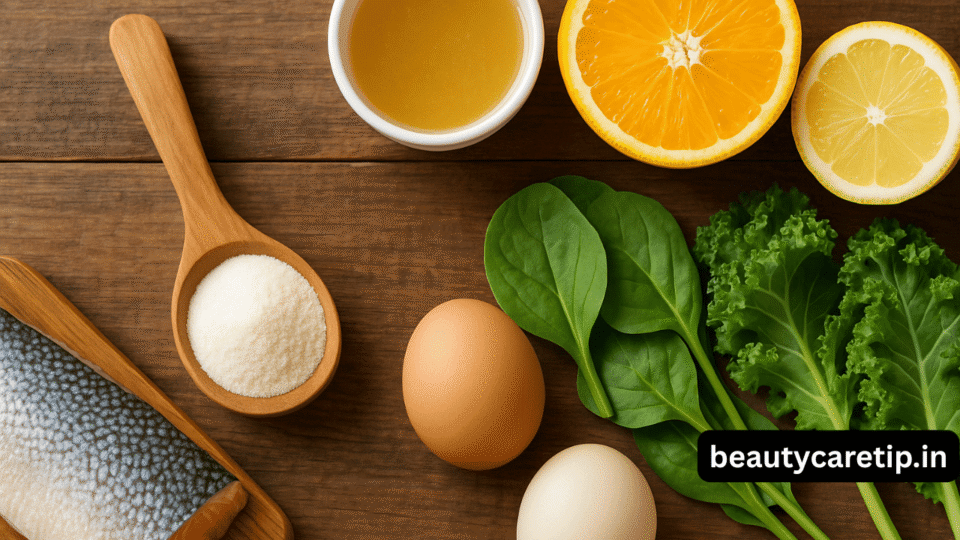In the world of health, skincare, and wellness, natural collagen peptides have become a buzzword for those looking to enhance skin elasticity, joint health, and overall youthful appearance. As we step into 2025, the demand for organic, sustainable, and natural approaches to beauty and wellness has made natural collagen peptides more popular than ever.
In this blog post, we’ll explore everything you need to know about natural collagen peptides — from what they are, how they differ from other collagen forms, their health benefits, natural sources, and how to boost collagen naturally through diet and lifestyle.
What Are Natural Collagen Peptides?
Contents
Natural collagen peptides are small chains of amino acids derived from the enzymatic breakdown (hydrolysis) of natural collagen. They are more easily absorbed by the body than standard collagen proteins, making them an ideal supplement or dietary addition for boosting collagen levels.
Collagen Peptides vs. Collagen
While collagen is a large protein molecule found in skin, bones, and connective tissues, collagen peptides are smaller fragments of that protein — making them more bioavailable and effective when consumed.
| Feature | Collagen | Collagen Peptides |
|---|---|---|
| Structure | Large protein | Hydrolyzed, smaller peptides |
| Absorption | Slower | Rapid absorption |
| Use | Skin, bones, tissues | Supplements, skin, joints, hair |
Benefits of Natural Collagen Peptides
Here are some top benefits of natural collagen peptides, backed by research and health professionals:
1. Skin Elasticity & Hydration
- Collagen peptides help reduce wrinkles and improve skin texture.
- They stimulate natural collagen production after 30, which typically declines with age.
2. Joint & Bone Health
- Collagen peptides for joints help reduce inflammation and improve flexibility.
- Improve bone density and reduce the risk of osteoporosis.
3. Hair and Nail Growth
- Promote stronger, healthier hair and nails.
- Prevent breakage and thinning over time.
4. Gut Health Support
- Collagen peptides may support gut lining repair, reducing leaky gut symptoms.
5. Muscle Mass & Recovery
- Ideal for post-workout recovery and muscle regeneration.
Natural Sources of Collagen Peptides
If you’re looking to boost collagen without synthetic supplements, consider these natural sources of collagen:
Collagen-Rich Foods:
- Bone Broth (beef, chicken, fish)
- Egg Whites
- Chicken Skin and Cartilage
- Fish Skin (Marine Collagen Peptides)
- Beef Tendons and Organ Meats
Collagen Boosting Foods:
- Citrus fruits – rich in Vitamin C, crucial for collagen synthesis
- Berries – contain antioxidants that protect collagen
- Leafy Greens – rich in chlorophyll and antioxidants
- Garlic – contains sulfur and taurine
- Nuts and Seeds – contain zinc and copper
- Tomatoes – high in lycopene for skin support
How to Boost Collagen Naturally in 2025
Looking for ways to increase collagen without pills or powders? Here are expert-backed methods to support your body’s natural collagen production:
1. Focus on Nutrient-Dense Diet
- Eat foods high in Vitamin C, Zinc, Copper, and Glycine.
- Combine collagen-rich foods with collagen-boosters like berries and citrus.
2. Include Hydrolyzed Collagen Peptides
- Easily digestible and more effective at stimulating collagen growth.
- Look for hydrolyzed collagen peptides with added Vitamin C.
3. Protect Against Sun Damage
- UV rays break down collagen; use SPF daily.
- Wear protective clothing and avoid tanning beds.
4. Reduce Sugar & Processed Foods
- Sugar creates AGEs (Advanced Glycation End-products) that destroy collagen.
5. Stay Hydrated
- Skin moisture relies on adequate water intake for collagen to function well.
6. Sleep & Stress Management
- Poor sleep and high cortisol hinder collagen synthesis.
Best Collagen Peptides for Anti-Aging
When choosing a collagen supplement in 2025, look for the following:
- Grass-fed bovine collagen peptides
- Marine collagen peptides from wild-caught fish
- Added hyaluronic acid and vitamin C
- Third-party tested for purity
How to Take Collagen Effectively
- Best Time to Take Collagen Supplements: Morning on empty stomach or post-workout.
- With or Without Food: Both are effective, but pairing with Vitamin C enhances absorption.
- Liquid, powder, or capsules – Choose the form that best suits your routine.
Do Collagen Peptides Work?
Yes. Studies published in journals such as the Journal of Clinical Nutrition and Dermato-Endocrinology have shown measurable improvements in skin elasticity, hydration, and joint function when collagen peptides are taken consistently for 8-12 weeks.
Side Effects of Collagen Peptides
Generally well-tolerated, but possible side effects include:
- Mild digestive issues
- Allergic reaction if derived from fish or eggs
Always check the label and consult a healthcare provider if unsure.
FAQs About Natural Collagen Peptides
Q1: Are collagen peptides safe to take daily?
A: Yes, most people can safely take them daily. Stick to the dosage mentioned on the label.
Q2: What’s the difference between marine and bovine collagen peptides?
A: Marine collagen is sourced from fish and is better for skin, while bovine collagen comes from cows and supports joints and bones.
Q3: Can I get enough collagen from food alone?
A: While food helps, supplements provide a concentrated dose that’s more effective for visible results.
Q4: Is collagen good after 30 or 40?
A: Absolutely! Natural collagen production decreases after 30, making supplementation beneficial.
Q5: Do I need Vitamin C with collagen?
A: Yes. Vitamin C is essential for converting collagen peptides into usable protein for the skin and tissues.
Final Thoughts
Natural collagen peptides are a powerful tool in your wellness and skincare arsenal. Whether you’re aiming to reduce wrinkles, improve joint health, or strengthen your hair and nails, integrating collagen-rich foods and peptides into your routine can make a visible difference.
